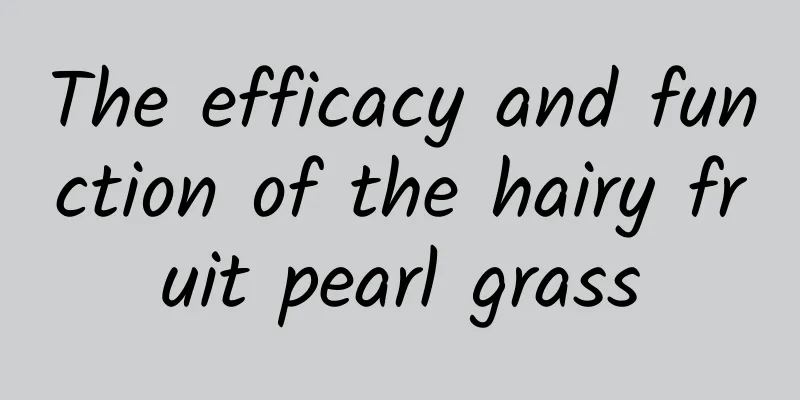The efficacy and function of the hairy fruit pearl grass

|
Hairy-fruited Pearl Grass is a traditional Chinese medicinal material. This type of medicine can cover many aspects of disease treatment, so before choosing Hairy-fruited Pearl Grass, you must have a good understanding of it. Let us introduce it in detail below. 【English Name】 all-grass of Hairyfruit Razorsedge [Other names] Three-sided front, corner grass, chicken knife, three-year-old grass [Source] Medicinal material source: Imperata cyperus rotundus, a plant of the Cyperaceae family. [Original form] Hairy-fruited Pearl Grass, perennial herb, 70-120cm tall. The creeping rhizome is thick, woody, and covered with purple-black scales. Culms sparse or scattered, robust, triangular, 3-5mm in diameter, pubescent. The leaves are linear, 7-10mm wide, with green sheaths in the middle of the culm, 1-3mm wide, and slightly pubescent. The leaves are linear, 7-10mm wide, with green sheaths in the middle of the culm and wings 1-3mm wide. The panicle is terminal or lateral, about 30cm long; the axis of the inflorescence is slightly pubescent; the bracts are leaf-like, nearly as long as the inflorescence; the bracteoles are bristle-like; the spikelets are unisexual, solitary, about 3mm long, the male spikelets are oblong-ovate, with oblique truncation at the apex; the female spikelets are located at the base of the branches, narrowly ovate-lanceolate; the scales are oblong-ovate, broadly ovate or ovate-lanceolate, 2-3mm long, with short rusty stripes, ciliated edges, and awned or short-pointed at the apex; there are 3 stamens, the anthers are linear, and the protruding part of the connective is 1/3-1/2 the length of the anther; there are 3 stigmas. The nutlet is nearly spherical, with a slightly short tip, about 2nm in diameter, white, with inconspicuous transverse ripples on the surface, and slightly covered with small hard hairs; the inferior disc is slightly narrower than the nutlet, light yellow, and deeply fissured in 3, with the lobes nearly lanceolate and obtuse at the apex. Flowering and fruiting period is from July to December. [Habitat distribution] Ecological environment: grows under forests, beside ditches, and in mountain grass. [Cultivation] Biological characteristics: It prefers warm climate and humid environment and is not cold-resistant. It is advisable to choose sandy loam with deep, loose and well-drained soil for cultivation. 【Nature and flavor】 Bitter; pungent; neutral 【Meridian】 Stomach meridian 【Functions and indications】Detoxification and swelling reduction; helps digestion and soothes the stomach. Mainly poisonous snake bites; simple indigestion in children [Usage and Dosage] For oral use: decocted in water, 3-9g. For external use: take appropriate amount and mash it for application. 【Note】 Pregnant women should not take this medicine. [Discussions by various scholars] "Xinhua Compendium of Materia Medica": It tastes pungent and bitter, and is neutral in nature. It has the effect of reducing swelling and detoxifying. Used for snake bites and simple indigestion in children. 【Excerpt】 Chinese Materia Medica The above is an introduction to some relevant knowledge about Glechoma longituba. Do you have a better understanding of it? I hope everyone can apply the hairy-fruited pearl grass in life to serve our health. |
<<: The efficacy and function of golden chrysanthemum
>>: The efficacy and function of chamomile
Recommend
Yellow rainstorm warning! Heavy rainfall is in a "round-the-clock battle", and the China Meteorological Administration has launched a level III emergency response for heavy rain
this morning The Central Meteorological Observato...
The efficacy and function of Asparagus cochinchinensis[picture]
In modern life, everyone is very familiar with va...
The efficacy and function of the bark of Psoralea corylifolia
Traditional Chinese medicine requires the use of ...
Is there any scientific basis for the idea that hiccups can be cured by being startled?
Reviewer of this article: Chen Haixu, Deputy Dire...
Why is it so easy to gain weight, but so difficult to lose weight?
Reviewer of this article: Chen Haixu, Deputy Dire...
Jules Verne's novel predicted air warfare half a century in advance
Editor's Note Military science fiction has a ...
Google: Analysis of strong revenue growth in B2B software
Google’s research shows that high-growth U.S. B2B...
How are human memories formed and retrieved? The clearest evidence to date emerges!
Written by: Liu Fang Editor: Huang Shan Layout: L...
What Chinese medicine is best for replenishing qi and blood?
As women’s status in the workplace becomes higher...
The efficacy and function of Tibetan catfish
We are all familiar with Tibetan catfish meat. It...
The efficacy and function of tiger ginger
Although Western medicine and Western drugs are m...
How to distinguish between real and fake wolfberries
I believe everyone is familiar with wolfberries. ...
Sunglasses should be replaced every 2 years, otherwise it’s the same as not wearing them?
gossip “Do I need to replace sunglasses every two...
Tea Science | Using the past to guide the present, how can we use tea to relieve the discomfort caused by a cold?
Recently, with the temperature fluctuating, many ...
HPV vaccine causes infertility, taking selenium-rich products can prevent cancer... Are these cancer prevention claims reliable?
The World Health Organization once proposed that ...









